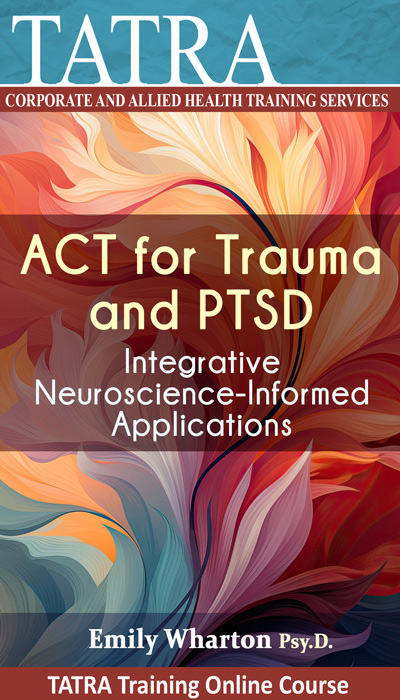29 Sep ACT for Trauma and PTSD: Integrative Neuroscience-Informed Applications

Acceptance and Commitment Therapy (ACT) is a mindfulness-based behavioral therapy that was developed in 1999 and has been studied for a wide range of treatment applications: depression, anxiety, chronic pain, substance abuse, shame, and transdiagnostic populations (Gloster et al, 2020; Morgan et al, 2021). Over the past 20 years, researchers have examined the effect of ACT on symptoms of PTSD as a standalone or conjoint treatment combined with other exposure-based approaches (Meyer et al., 2018; Orsillo & Batten, 2005; Thompson et al., 2013; Walser & Westrup, 2007; Wharton et al., 2019).
This workshop presents the ACT model and its application for PTSD through intrapsychic, interpersonal, and neuropsychological processes, such as thought suppression, experiential avoidance, “window of tolerance” (Aikins et al., 2009). Participants will learn the six core processes of ACT: acceptance, defusion, mindfulness, self as context, values, and committed action. Neuroscience research on the internal processes that maintain PTSD and the effect of ACT practices on these patterns will be discussed. Participants will learn how each core process of ACT and ACT-based exposure can help individuals reconnect with the natural trauma recovery process. Participants will practice experiential exercises and will learn how to help individuals struggling with PTSD recover and improve their quality of life.


This training will provide participants clinical knowledge and tools to:
a). Describe the core tenets, principles, and underlying theory of Acceptance and Commitment Therapy (ACT).
b). Explain how the ACT model fits the presentation of Posttraumatic Stress Disorder (PTSD).
c). Learn and describe the six core processes of ACT and their application to PTSD.
d). Describe underlying processes of thought suppression, experiential avoidance, and “window of tolerance.”
e). Explain how ACT-based exposure helps clients approach trauma-related content and values-based activities.
f). Describe how ACT can enhance other exposure modalities in the treatment of PTSD.
Target Audience:
The target audience for this event includes psychologists, social workers, counselors, MFT’s, psychiatrists and other clinical mental health professionals.


This online workshop will give you instant access to the course video content, accessible via streaming on our website, as well as downloadable slide deck. You can view the course content in your own time, there is no time limit on access. The duration of this online course is 6 learning hours.
Please click the green ‘Mark Complete’ button on each module as you progress.
A certificate of completion will be generated upon finishing the course and completing a short assessment quiz. If the certificate is not showing, please confirm you have marked all sections as ‘Complete’. Please consult your professional organisation/association to confirm whether you are able to claim any CPD points/hours for this online workshop.



 Emily Wharton, Psy.D. is a Clinical Assistant Professor (Affiliated) of Psychiatry and Behavioral Sciences at Stanford University School of Medicine, and a licensed clinical psychologist in the Palo Alto VA and her private practice.
Emily Wharton, Psy.D. is a Clinical Assistant Professor (Affiliated) of Psychiatry and Behavioral Sciences at Stanford University School of Medicine, and a licensed clinical psychologist in the Palo Alto VA and her private practice.